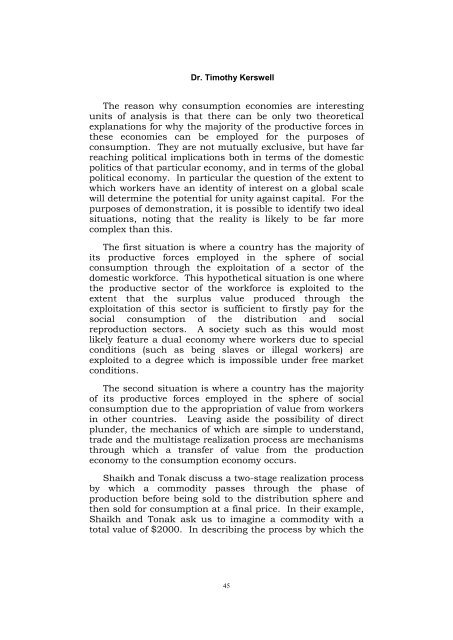Class, Productive and Unproductive Labour - Journal of Alternative ...
Class, Productive and Unproductive Labour - Journal of Alternative ...
Class, Productive and Unproductive Labour - Journal of Alternative ...
You also want an ePaper? Increase the reach of your titles
YUMPU automatically turns print PDFs into web optimized ePapers that Google loves.
Dr. Timothy KerswellThe reason why consumption economies are interestingunits <strong>of</strong> analysis is that there can be only two theoreticalexplanations for why the majority <strong>of</strong> the productive forces inthese economies can be employed for the purposes <strong>of</strong>consumption. They are not mutually exclusive, but have farreaching political implications both in terms <strong>of</strong> the domesticpolitics <strong>of</strong> that particular economy, <strong>and</strong> in terms <strong>of</strong> the globalpolitical economy. In particular the question <strong>of</strong> the extent towhich workers have an identity <strong>of</strong> interest on a global scalewill determine the potential for unity against capital. For thepurposes <strong>of</strong> demonstration, it is possible to identify two idealsituations, noting that the reality is likely to be far morecomplex than this.The first situation is where a country has the majority <strong>of</strong>its productive forces employed in the sphere <strong>of</strong> socialconsumption through the exploitation <strong>of</strong> a sector <strong>of</strong> thedomestic workforce. This hypothetical situation is one wherethe productive sector <strong>of</strong> the workforce is exploited to theextent that the surplus value produced through theexploitation <strong>of</strong> this sector is sufficient to firstly pay for thesocial consumption <strong>of</strong> the distribution <strong>and</strong> socialreproduction sectors. A society such as this would mostlikely feature a dual economy where workers due to specialconditions (such as being slaves or illegal workers) areexploited to a degree which is impossible under free marketconditions.The second situation is where a country has the majority<strong>of</strong> its productive forces employed in the sphere <strong>of</strong> socialconsumption due to the appropriation <strong>of</strong> value from workersin other countries. Leaving aside the possibility <strong>of</strong> directplunder, the mechanics <strong>of</strong> which are simple to underst<strong>and</strong>,trade <strong>and</strong> the multistage realization process are mechanismsthrough which a transfer <strong>of</strong> value from the productioneconomy to the consumption economy occurs.Shaikh <strong>and</strong> Tonak discuss a two-stage realization processby which a commodity passes through the phase <strong>of</strong>production before being sold to the distribution sphere <strong>and</strong>then sold for consumption at a final price. In their example,Shaikh <strong>and</strong> Tonak ask us to imagine a commodity with atotal value <strong>of</strong> $2000. In describing the process by which the45
















